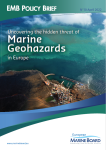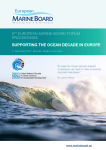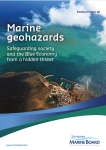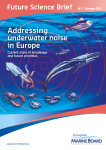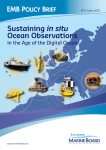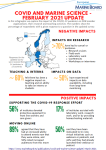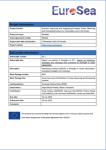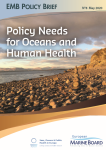Although the impact of the pandemic continued to be noticeable for all, we can look back on a successful 2021 in the end. This year marked the start of the UN Decade of Ocean Science for Sustainable Development, to which the EMB proudly became the very first Implementing Partner. This news was shared during EMB's 8th Open Forum, organized as a hybrid event in Brussels and online, where a wide variety of Ocean stakeholders were brought together. EMB was able to publish three publications and launch the impact video for the NFV document. Find out all about our activities in the EMB Annual Report 2021.
Homepage publication
Today, our society depends on critical coastal and marine infrastructure such as ports, telecommunication cables and renewable energy installations. With increasing human activities conducted in the marine environment and an increasing population living at the coast, society is becoming more exposed and vulnerable to the impacts of marine geohazards. This Policy Brief raises awareness about dormant geological risks in European coastal regions, and makes recommendations for future research and policy. It summarises the main messages and recommendations from the recent EMB Position Paper Nº26 on “Marine Geohazards: Safeguarding Society and the Blue Economy from a Hidden Threat”, published in December 2021.
The 8th EMB Forum took place in Brussels and online on 1 December 2021, and was on the topic of "Supporting the Ocean Decade in Europe". Over 100 participants from Europe and further afield engaged both online and in person, representing academia, early career researchers, policy-makers, industry, and NGOs. This document is a summary of the discussions, and full recordings of the sessions are available on the EMB YouTube Channel.
Considering that marine geohazards are unavoidable and will certainly continue to occur in the future, it is crucial to improve and expand our knowledge of those events. EMB Position Paper Nº26 presents an overview of the type, distribution and impact of marine geohazards on the European coastal regions and Blue Economy sectors. It highlights novel scientific approaches that broaden our understanding of their processes, trigger mechanisms and precursors. The document points towards relevant actions that would ensure the development of effective risk-mitigation and science-based management practices and policies, thereby contributing to protect coastal population and economic activities at sea.
EMB Future Science Brief N°7 outlines the current state of our knowledge on the sources of anthropogenic sounds and the effects of noise on marine organisms. Moreover, it provides an overview of the measures that have been taken to address the issue of underwater noise. In order to develop proportionate mitigation strategies and effective regulation, we have to advance our knowledge about the effects of anthropogenic noise on marine organisms and their ecosystems.
This Policy Brief focuses on in situ Ocean observations and highlights their benefits, funding and governance challenges, and the investment needed for their transformation and sustainability. This document is the result of an ad hoc Working Group established by the European Marine Board to address this topic, in light of the UN Decade of Ocean Science for Sustainable Development, and the start of Age of the Digital Ocean.
The 7th EMB Forum took place online on 23rd October 2020 on the topic of 'Big Data in Marine Science: Supporting the European Green Deal, the EU 2030 Biodiversity Strategy, and a Digital Twin Ocean'. 192 participants from Europe and further afield were present, representing academia, government, industry, and NGOs. Experts gave presentations and participated in panel discussions, with audience interaction. This document is a summary of the discussions, and full recordings of the sessions are available on the EMB YouTube Channel.
This Policy Brief highlights the inextricable links between oceans health and human health. It presents the main challenges in moving towards a European policy framework that supports and enables Oceans and Human Health to be addressed in a holistic manner. It highlights the research, training, data, monitoring and funding needs to enable such a policy framework to be developed. This publication was produced together with the EU-funded SOPHIE project.

